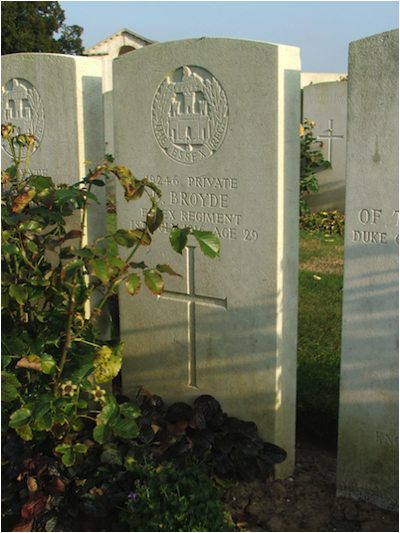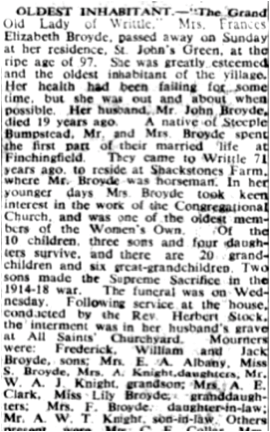Dick Broyde was born and brought up in Writtle. He joined the army and was killed on the opening day of the Battle of the Somme in July 1916. A brother also lost his life during the war.
BROYDE, DICK,
Private, 2nd Battalion, Essex Regiment
When the attack was launched at 9 a.m. on 1st July 1916 Dick’s battalion emerged from their trenches an hour and a half after an attack from colleagues in the 11th Brigade to advance past those comrades and capture a portion of the Puisieux to Grandcourt ridge. It was rolling chalky country, overlooked by enemy positions, with the hamlet of Serre on top of the slopes that faced the Essex men. Their line of attack was by the right of Pendant Copse, directly on the church spire at Miraumont, which lay in a hollow on the River Ancre beyond the ridge. The battalion suffered considerably from shell-fire, but were able to reach and reinforce comrades in the Rifle Brigade and Warwickshire Regiment. Some troops entered the enemy’s Munich trench and the western edge of Pendant Copse. From around 11 a.m. they were gradually pushed back in bitter fighting from those locations throughout the rest of the day to a position known as the ‘Quadrilateral’. The survivors were replaced by fresh troops around midnight.
At the start of the day 24 officers and 606 other ranks of Dick’s battalion had gone into action, and by the evening had been reduced to only two officers and 192 other ranks. Among the dead was Dick who was killed in action while serving as Private 19246. He was aged 29. Today he lies in Serre Road Cemetery No.2, some 11 kilometres north of Albert (grave: I. J. 18). The cemetery, close to the site of the ‘Quadrilateral’, was begun in May 1917.
Dick is commemorated on the Civic Centre Memorial, Chelmsford, and by the Writtle War Memorial at The Green in Writtle. He was entitled to the British War Medal and Victory Medal.
The 1918 register of electors recorded Dick’s parents resident at St. John’s Green, Writtle.
Dick’s brother Sam also lost his life in the war, but is not commemorated on the Civic Centre Memorial, Chelmsford. He was killed in action on 12th October 1916 while serving as Private 19477 of the 1st Battalion of the Essex Regiment and his name appears on the Writtle war memorial. His medals are pictured below/
Dick’s father died in 1927, aged 76. His mother had reached the ripe age of 97 when she died in 1946. At the time she was the oldest resident in Writtle and known as ‘The Grand Old Lady of Writtle.’
221126

He was born in 1887 in Writtle, one of ten children of Andrew John ‘John’ Broyde and Frances Elizabeth Broyde (nee Willis). Dick’s father had been born c1851 in Finchingfield; his mother in 1848 at Steeple Bumpstead. The couple married in 1873 and in 1876 came to Writtle where Andrew was a horseman at Shakestone’s Farm. In 1881 the census recorded them living at Shaxton’s Cottage, Shaxton’s Farm (today ‘Shakestones’), Writtle, with five of Dick’s elder siblings.
His nine siblings were: Elizabeth Amelia Broyde (1874-1952), Frederick William Broyde (1875-1950), William Broyde (1876-1971), Susannah Broyde (1878-1975), Julia Broyde (born 1881), George Broyde (born 1882), Jack Broyde (1884-1973), Martha Broyde (born 1st July 1889), and Sam Broyde (1893-1916). Elizabeth and Frederick were born in Finchingfield, the others at Writtle.
The 1891 census found Dick, aged four, living with his parents and siblings at Shactons in Writtle. His father and brother Frederick were agricultural labourers. Ten years later the family remained at the premises. Dick and two brothers were general agricultural labourers; their father was a horseman on a farm. In 1911 the census listed 24 year-old Dick living with his parents and brother Jack at St. John’s Green in Writtle. All three men in the household were employed as horsemen on a farm.
Dick enlisted into the army at Chelmsford and served with the 2nd Battalion of the Essex Regiment, a regular army unit that was at Sheerness in Kent at the start of the war. The battalion, possibly including Dick, crossed the English Channel from Southampton on the S.S. Corsican, landing in Le Havre early on 24th August 1914.
At the end of June 1916 Dick’s battalion, part of the 12th Brigade of the Army’s 4th Division was in Bertrantcourt, to the north of Albert in the Somme region of France. On the evening of 30th June 1916 troops of the battalion left the village and proceeded to assembly trenches, ready to form part of the following day’s attack to seize high ground between Puisieux and Grandcourt.

